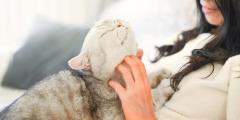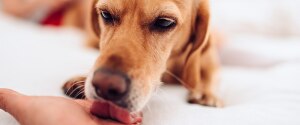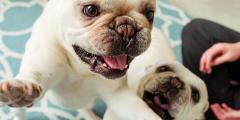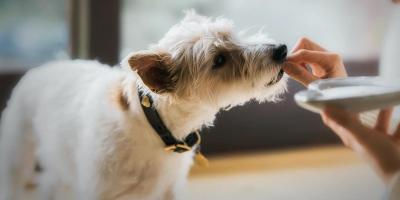
Some behaviours are just iconically dog. Barking, the confused head tilt, the spin before laying down and licking are all normal parts of being a dog, but licking in particular can be a confusing behaviour for owners to understand — and control. Learning why dogs lick can help you get a different perspective on your pet and give you a better starting point for limiting problematic licking.
Why Do Dogs Lick Themselves and Other Dogs?
Dogs may lick themselves to clean a wound or remove parasites like fleas, but they also lick themselves for grooming reasons. Whether it's a particularly itchy spot that needs more than a scratch, there's a tender area you can't see through the fur or they're just cleaning a stray bit of dirt off, a dog licking themselves can be seen as akin to a sponge bath. The exception to this is if there is obsessive licking that causes hair loss and hot spots or if licking is confined to the paws, which is a trademark sign of allergies.
When it comes to other dogs, licking is a social behaviour. According to Dr. François Martin, Purina pet behaviour scientist, social grooming starts very early in a dog's life, with the mother licking newborn puppies to clean them, encourage them to eliminate and provide comfort. In later years, it's a way for your dog to politely greet a friend (licking is usually only seen in dogs who know each other) and indicate they aren't a threat.
Why Do Dogs Lick People?
Just like with other dogs, your pet licking you or other humans in your household is a mostly social, friendly behaviour. It indicates "Hi! I love you!" or "I'm so happy to see you. Look how good I've been" and is a way for your dog to bond with you. Of course, if you have any kind of food residue on your mouth or hands, your dog's licking may also serve an ulterior motive of trying to get an extra taste.
How to Stop a Dog From Licking
Whether your dog is obsessively licking himself or you want to stop your dog licking you or your guests, determining how to stop problematic licking behaviours starts with figuring out the source. If your dog has just started licking or has dramatically increased how much they're licking — especially if they are chewing at their fur or licking their paws — this could be a sign of a skin allergy or other medical condition, and it's a good idea to get your pet vetted to rule any underlying medical cause out.
Once you've determined this is a behavioural issue, you can stop your dog from licking with the following tips:
- Be consistent. If you let your dog lick you sometimes and not others, your dog won't understand the difference or see this as a behaviour you're trying to stop, so it's important to tell your dog no every time they try to lick you and enforce it by leaving the area or withdrawing attention.
- Give your dog an approved option. A toy stuffed with treats or new dog bone (make sure to check with your vet to see which products they recommend first) may help him stop licking and redirect his energy into another more appropriate behaviour such as chewing.
If you're concerned about licking behaviours in your dog, visiting the vet is always the first step. But in the majority of cases, it's not an actual medical problem. Purina has a wealth of resources that can help you better understand why your dog does what he does and what it means for your bond.
Related articles



